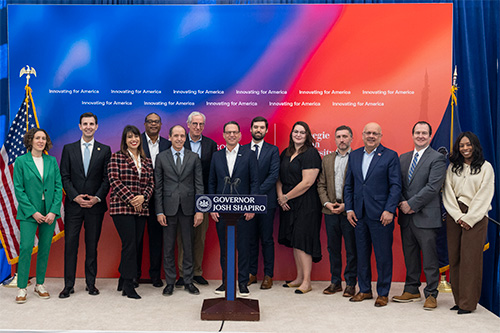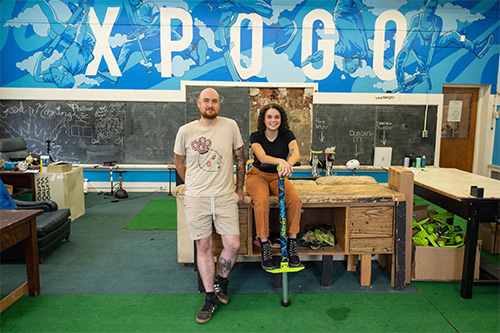

Innovation in Service of Humanity
Societal Impact
Innovating for a Better World
At Carnegie Mellon, the pursuit of knowledge goes hand in hand with a deep commitment to serving the greater good. CMU's faculty, students, staff and alumni are driving societal change through world-class research, inclusive educational opportunities and hands-on partnerships that address real-world challenges at the local, national and global levels.
Researching Solutions to Grand Challenges

Carnegie Mellon is committed to ensuring that technology enhances society, humanity and our planet. We continually advance knowledge that illuminates technology's impact on the environment, the economy, as well as citizens and communities. At a time when CMU’s strengths in emerging technologies and cutting-edge science are aligned with the needs of society, we are building a better environment for curiosity-driven discovery and continuing to make significant contributions to economic growth and quality of life in Pittsburgh, Southwestern Pennsylvania and beyond.
CMU has more than 100 research centers and institutes, which address a broad range of interests, industries and solutions to real-world problems. For example: The AI Institute for Societal Decision Making leverages AI to improve decisions across public policy, health care and humanitarian response.
Civic Engagement in Action

Civic engagement is an essential part of a Carnegie Mellon education, from orientation through commencement. The Office of Community Engagement and Leadership Development organizes and supports long-standing programs and opportunities for students to contribute to the greater Pittsburgh community.
The Office of Student Involvement and Traditions provides resources and support to the 400+ student-run organizations recognized by Student Government and the more than 20 sororities and fraternities active on Carnegie Mellon's campus. Student organization leaders and members work together to create and engage in meaningful and enriching experiences through their organizations and events. They contribute to the CMU community and beyond through their missions and goals, creating the rich and diverse fabric of student engagement and involvement at CMU.
Removing Barriers, Inspiring Innovators

Mirroring the undergraduate experience, CMU's Pre-College Programs offer immersive summer programs for high school students in disciplines ranging from computer science and computational biology to drama and design. These programs attract students from across the nation and foster a pipeline of talent prepared to take on tomorrow's societal challenges. Computer Science Scholars, AI Scholars, and the Summer Academy for Math and Science — all Pre-College Programs — are fully funded, multi week and residency-based initiatives dedicated to bolstering access to STEM education.
Launched in the 2025-2026 academic year, the CMU Pathway Program seeks to make a Carnegie Mellon education accessible and affordable for deserving, high-achieving students. Under the program, students from families earning $75,000 or less annually will attend CMU tuition-free, and, for students from families earning $100,000 or less annually, the university will meet 100% of their demonstrated financial need, which will enable participating students to attend CMU without needing to utilize federal loans.
Commitment to a Better Future

In 2019, Carnegie Mellon committed to incorporating the Sustainable Development Goals , also known as the Global Goals, into education, research and practice. A year later, CMU became the first university in the world to publish a Voluntary University Review of the Global Goals, sending a strong signal that universities are also critical partners in achieving the 17 ambitious goals by 2030. Situated within University Libraries, CMU’s Sustainability Initiative continues to publish voluntary university reviews of the goals. The initiative also aids faculty and staff in showcasing their sustainability achievements and activities and hosts a Sustainability Studio to help members of the university community connect, discuss and collaborate across disciplines and in service of the Global Goals.
Whether it's pioneering air quality monitoring technology, designing robots for social good or educating the next generation of changemakers, we don’t just talk about change — we engineer it. Through a holistic approach to research, education and outreach, CMU is proud to lead in advancing societal impact one discovery and relationship at a time.

Get Involved
Volunteer or partner with us to help create lasting economic and community impact in the region.